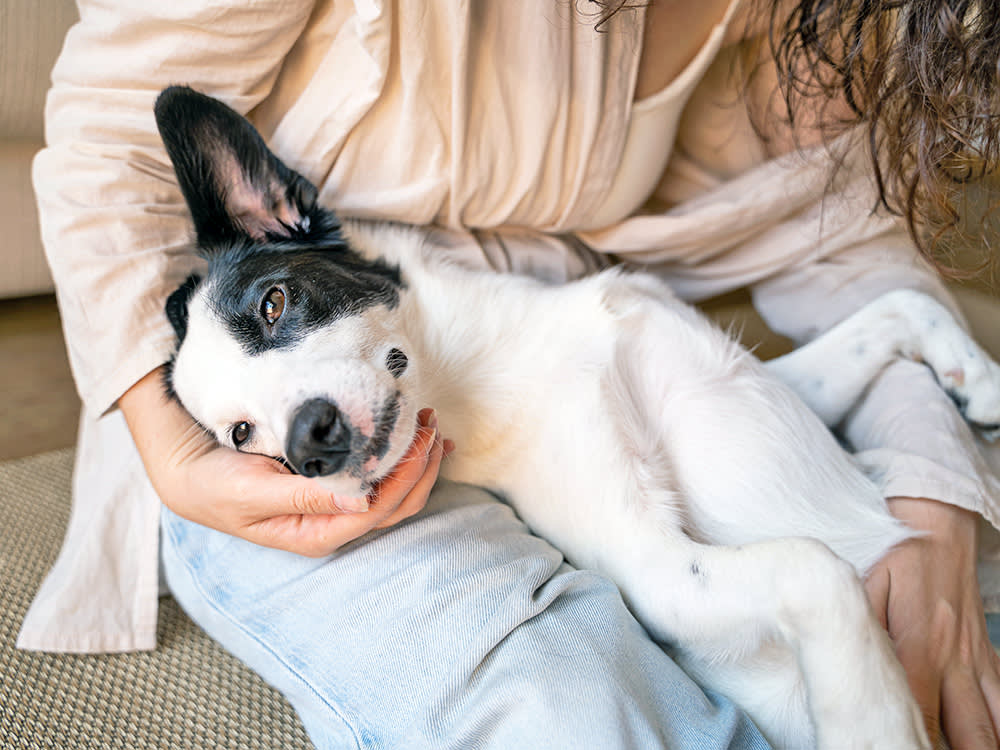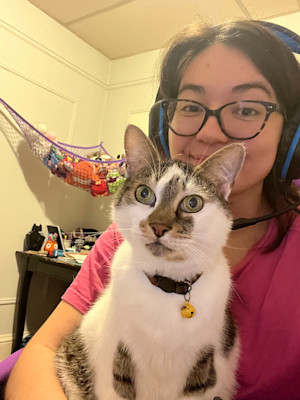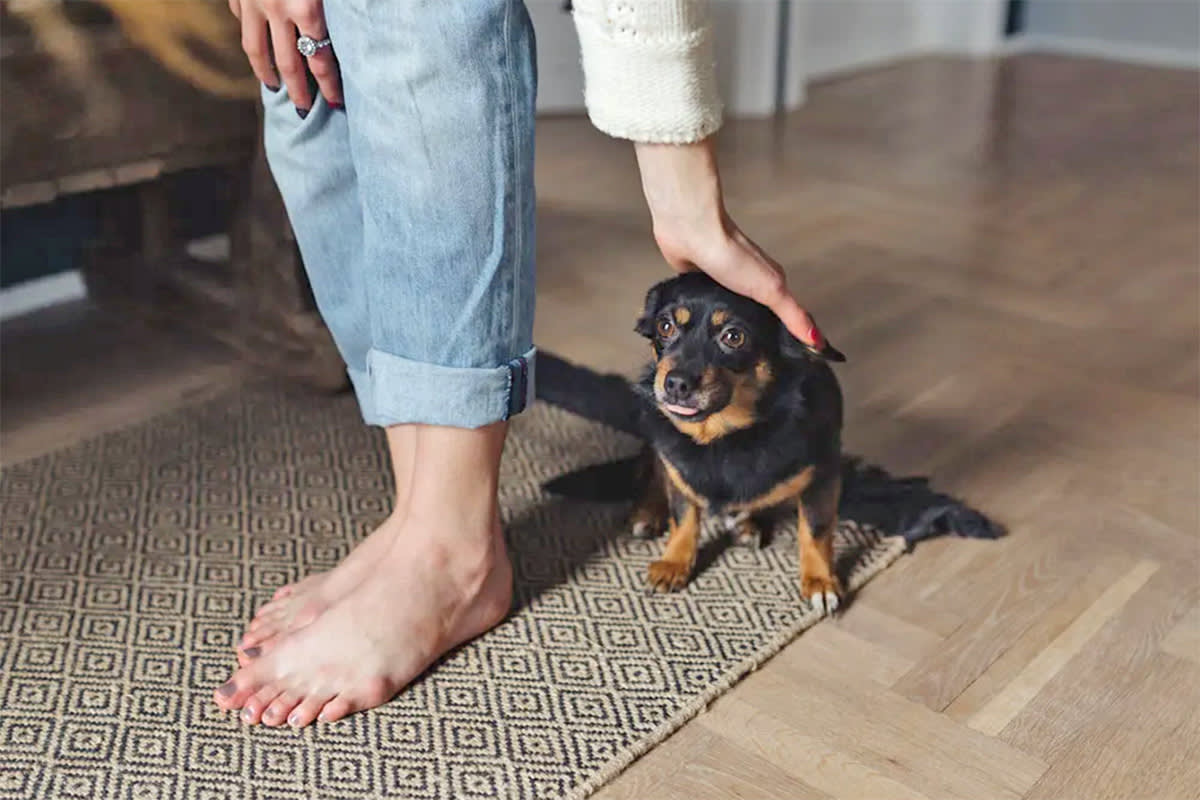Is Your Pet Actually Stressed Out, or Are You Just Projecting?
How to know when it’s real—and time to call the vet.

Share Article
As a deeply anxious person, I’m always worried about the people around me. When it comes to my friends and family, I can always ask how they’re feeling. But it’s a little different when it comes to my cat, Bagel. Sometimes, I wish we had a psychic connection so I could know if he’s really OK. Yes, he’s been sleeping in the same sunbeam for the past two hours, but is he really enjoying it?
I’m not alone, apparently. A recent studyopens in new tab by SATELLAI reveals that 52 percent of pet parents say that the most valuable thing they’d want to know about their pets is how they’re feeling. It makes sense to me. I have concrete proof that Bagel has food, water, and plenty of pets.
But unless I can read his mind, I have to rely on his body signals to tell if he’s stressed. Thankfully, with a little guidance, it’s not that hard to pick up on our pets’ moods. Here’s the kicker: What if what we are observing has more to do with our own anxiety than theirs?
Below, we get into it all, including how to pick up on our pets’ stress, how to differentiate theirs from ours — and not let our anxiety affect them.

First of all, what are some signs of stress in pets?
The good news is that pets are pretty up front about how they’re feeling. When it comes to cats, anxiety and stress usually manifests in one of two ways.
“There’s either avoidance behaviors or sometimes aggressive behaviors,” says feline behavior expert Stephen Quandt of Cat Behavior Helpopens in new tab.
Aggressive behaviors typically manifest with the introduction of a new animal. Previously, calm cats may become combative and will often hiss, growl, or yowl. Avoidance usually means the cat will hide, be it in a closet or under the bed. This is usually coupled with fearful body language: dilated pupils, ears going back, and low-crouching. Other behaviors to watch out for are appetite changes — be it eating too much or not eating at all — and going to the bathroom outside the litter box.
With dogs, Dr. Katherine A. Houptopens in new tab, a veterinarian and behavior specialist, says that habits will change. Your dog might sleep more or less, or their appetite might be diminished. Or they might lick or scratch too much. And it’s more subtle, but their facial expressions and body language also change.
“They’re more difficult to read than humans, at least for humans,” Dr. Houpt says. “But they may squint their eyes or tense their chin muscles and pull their ears back and all those, or signs of stress.”
When stressed, dogs often exhibit something known as “displacement behaviors.” This is when they perform a normal behavior, but in a strange context. So if they start to excessively pant when they haven’t been exercising, or if they yawn in an intense and prolonged manner, it might be a sign that they’re actually anxious.
Ultimately, pet parents know their pets’ behavior better than anyone. If something seems unusual about the way your pet is behaving, then they’re probably stressed.
Is your own anxiety the real problem here?
Lots of pet parents swear that their pets can pick up on their emotions and moods. Naturally, if you’re as prone to worrying as I am, you might wonder if your own stressed-out mood is making your pet anxious.
Quandt says that while cats can certainly pick up on your emotions, it’s not a psychic connection or anything like that.
“Cats can read your body language, your tone of voice and your behavior,” he says. “It’s the same thing. It’s a two-way street. It’s how we have conversations with cats. We’ll do something, the cat responds and does something and we take what they do as communication back to us.”
But rest assured that your pet is not taking your anxiety and amplifying it in themselves. Much like managing your pets’ anxiety, your own worry shouldn’t be a cause of concern, unless it’s vastly impeding your life or disproportionate to the situation. After all, worry for your pets comes from a place of love — and ultimately, it serves a purpose and helps you be the best caretaker to your pet that you can be.
When should you be concerned?
That said, when should you actually have cause to call the vet? Any pet parent knows that sometimes the smallest things can make your pup or kitty anxious. Very often, it’s a one-time occurrence that will go away — like traffic, fireworks, or a stray cat who wandered into your backyard and is making your dog lose it. In those cases, you don’t necessarily need to worry too much.
Quandt says it’s when the reaction becomes disproportionate to the situation that you might want to worry more.
“If it’s an occasional stressor, then maybe we’re a little bit less concerned,” Quandt explains. “But if the cat doesn’t recover in a reasonable period of time, and they appear to be stressed for a while, then it’s really concerning. The worst condition is when we say that the cat has become fearful in their own home, and then that’s completely untenable. And typically when a cat is really stressed or scared, that's when people contact people like me.”
Dr. Houpt emphasizes that if the behavior starts to impede a pet’s day-to-day, then it’s time to see a professional.
“If it interferes with the dog’s life, if they used to sleep, take two-hour naps every three hours, and now they’re awake all the time, that’s a sign that they are having some problems,” she says. “If they are off their food enough, [that] they are actually losing weight, you should do something about that.”
Both Quandt and Dr. Houpt agree that it’s a good idea to eliminate physical problems first before consulting a behaviorist. After all, a behaviorist or trainer won’t be able to help a pet who has an underlying medical condition. So, if your pet’s anxious behavior is becoming more frequent and disruptive, go to a vet first to make sure there isn’t a physical health problem.
What can you do to help your pet feel better?
Regardless of its cause, pet anxiety is relatively easy to relieve. Our human instincts might not exactly be what our pets need out of the situation.
“Sometimes, a person’s response is to pick up their cat and swaddle them and go, ‘Coochie, coochie, coo — everything’s going to be OK,’” Quandt says. “In nature, there was no big cat that picked up the anxious cat and held him and told him it was going to be OK. But mama cat would provide comfort for her kittens and would preen them and sit next to them and maybe take them to a new location. So think like a cat: What does your cat want?”
The best thing you can do for your stressed pet is to control the stressor as best you can and then give them the opportunity to resolve their emotions in a way that feels safe to them. Maybe this means you make a quiet space for your dog when home renovations are going on and then make sure to play extra with them once the workers go home. Or maybe you let your cat hide in the closet when the robot vacuum is running and giving them something that smells comforting.
What you should absolutely not do is scold your pet for their stressed behavior.
“Yelling at the dog is not going to help anything,” Dr. Houpt says. “You have to figure out what is bothering the dog and try if possible, either to remove the dog from that situation or to change the situation.”

Petrana Radulovic
Petrana Radulovic is a New York City-based writer who focuses on entertainment and culture beats. In her free time, she writes fiction, sings karaoke, and tries new recipes. Her work has appeared in Polygon, IGN, Reactor, and more. She lives with a very affectionate cat named Bagel, who loves head kisses and meeting people at parties. He is smart enough to open cabinets but still too dumb to understand stairs.
Related articles
![Woman meditating with her chocolate lab in the living room.]()
Why You Should Do Breathwork With Your Dog—Really
It might sound woo-woo, but it can benefit you both.
![Bored gray cat at home.]()
What Really Happens to Your Cat When You’re Too Busy to Play With Them
For starters, get ready to clean up some messes.
![Woman holding her dog outside.]()
Do Dogs Actually Raise Our Serotonin Levels?
They sure feel like the key to happiness.
Why Are Chihuahuas Always So Clingy?
Your Chi’s purpose is… you.
![A woman sitting on a floor playing with her dogs.]()
How to Know if Your Dog Has Imprinted on You
If they’re following you around like your shadow, there’s a reason for that.
Can Cats Have Panic Attacks?
How to know something more serious isn’t going on.







